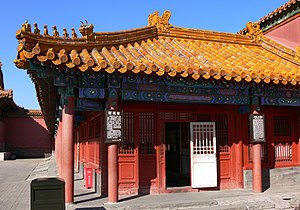
Back Gran Consejo (dinastía Qing) Spanish Grand Conseil (Chine) French Dewan Agung (Dinasti Qing) ID Gran consiglio (Cina) Italian 軍機処 Japanese 군기처 Korean Storrådet NB Rada Wojenna (Cesarstwo chińskie) Polish மாபெரும் சபை (சிங் வம்சம்) Tamil จฺวินจีชู่ Thai

| Grand Council | |||||||||
|---|---|---|---|---|---|---|---|---|---|
| Traditional Chinese | 軍機處 | ||||||||
| Simplified Chinese | 军机处 | ||||||||
| |||||||||
| Banli Junji Shiwu Chu | |||||||||
| Traditional Chinese | 辦理軍機事務處 | ||||||||
| Simplified Chinese | 办理军机事务处 | ||||||||
| Literal meaning | Office for the Handling of Confidential Military Affairs | ||||||||
| |||||||||
The Grand Council or Junji Chu (Chinese: 軍機處; Manchu: ![]() coohai nashūn i ba; literally, "Office of Military Secrets"), officially the Banli Junji Shiwu Chu (Chinese: 辦理軍機事務處; "Office for the Handling of Confidential Military Affairs"), was an important policy-making body of China during the Qing dynasty. It was established in 1733 by the Yongzheng Emperor. The council was originally in charge of military affairs, but gradually attained a more important role and eventually attained the role of a privy council, eclipsing the Grand Secretariat in function and importance, which is why it has become known as the "Grand Council" in English.
coohai nashūn i ba; literally, "Office of Military Secrets"), officially the Banli Junji Shiwu Chu (Chinese: 辦理軍機事務處; "Office for the Handling of Confidential Military Affairs"), was an important policy-making body of China during the Qing dynasty. It was established in 1733 by the Yongzheng Emperor. The council was originally in charge of military affairs, but gradually attained a more important role and eventually attained the role of a privy council, eclipsing the Grand Secretariat in function and importance, which is why it has become known as the "Grand Council" in English.
Despite its important role in the government, the Grand Council remained an informal policy making body in the inner court and its members held other concurrent posts in the Qing civil service. Originally, most of the officials serving in the Grand Council were Manchus, but gradually, Han Chinese officials were admitted into the ranks of the council. One of the earliest Han Chinese officials to serve in the council was Zhang Tingyu. The chancellery was housed in an insignificant building just west of the gate to the Palace of Heavenly Purity in the Forbidden City.